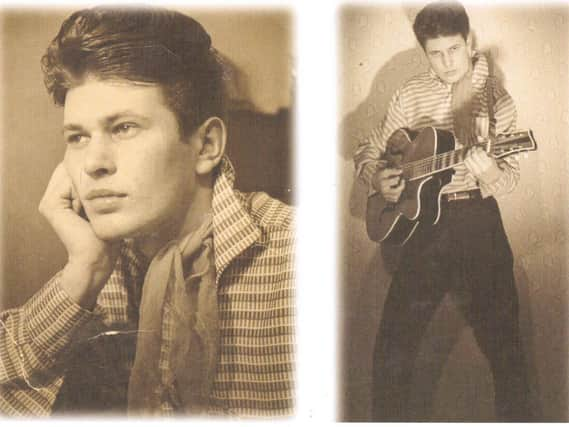Former Advertiser reporter remembers the unsung heroes of Rugby's rock 'n' roll revolution


It took a while for the early 1960s rhythm and blues wave to hit the shores of Rugby’s music scene… but when it finally broke, it was indeed a veritable tsunami.
The signs that something big was approaching had become apparent during the pivotal year of 1963. The Benn Memorial Hall had started running a weekly dance session called Teen Beat at the dawn of that decade, but was nothing to what followed.
Advertisement
Hide AdAdvertisement
Hide AdTeen Beat was before my time at the Benn, but it’s probably safe to say that a typical group’s repertoire would have been a blend of the new black sounds coming in across the Atlantic and the lingering echoes of 1950s rock ‘n’ roll.
But Little Richard and Eddie Cochran were by now increasingly being pushed aside by artists such as Larry Williams, Arthur Alexander, DorisTroy and hard-edged bands such as The Contours.
But then in the early summer of 1963, everything changed. And the new Rugby kids on the block were Sam Spade and the Gravediggers, The Ravens, The Reprobates, The Cataracts, The Twilights, the Surf Cyders and many more.
At the top of the tree were The Fortunes, Mighty Avengers and The Liberators, soon to become Pinkerton’s Assorted Colours. At one time, it seemed that every other young lad in Rugby was playing guitar or drums.
Advertisement
Hide AdAdvertisement
Hide AdThese outfits were also paying homage to new heroes, men such as Slim Harpo, Jimmy Reed, Rufus Thomas, Chuck Berry and Howling Wolf. By 1964, Rugby was firmly on the map as the premier rock ‘n’ roll town of the Midlands.
Turning my back pages of more than five decades, I surprise myself sometimes when I reflect just how exciting was this period. I have one particularly fond memory from September, 1964, when the legendary Beggars’ Ball was held at Bridget Street Drill Hall.
Sam Spade was the main act and a packed crowd danced as if their lives depended on it. I’ll never forget Bob Bostrom’s lurching bass riff on I’m A King Bee and Dave Varnish’s relentless Bo Diddley chord chops on You Can’t Judge a Book by Looking at the Cover.
Oh what a night. Rudi Valli must surely have had the Drill Hall in mind when he wrote that.
Advertisement
Hide AdAdvertisement
Hide AdIn the wake of all these groups came a new species, a breed that would prove invaluable. And that was the roadie.
Soon, every outfit had at least one of these long-suffering backroom boys.
They had to be not just jacks-of-all-trades, but masters too. A typical night’s work might well comprise the following.
First, establish the location of the gig, then drive a rickety old van to the venue at least a couple of hours before the group went onstage. On arrival, the gear had to be set up, followed by a sound check.
Advertisement
Hide AdAdvertisement
Hide AdIf an amplifier or microphone started to malfunction, our roadie might well have to get out his screwdriver and put his knowledge of electrics to
the test.
At the end of the night, he’d have to carry the gear back to the van, and finally drive everyone home, undoubtedly arriving back in the early hours of the morning.
He’d then flop into bed, try to sleep despite a 12-bar blues running through his head, and then get up a few hours later to do his day job. And when his shift was finished, he’d most likely have to repeat the process as the gigs were plentiful in those days.
Rugby’s roadies were a special breed and a few names spring to mind, guys such as Patrick Garrett, Graham Claydon, Richard Bott and Frank Bochniak.
Advertisement
Hide AdAdvertisement
Hide AdI well remember doing an interview with the latter two, who were at the time roadies for Big Idea, a Rugby band that had evolved out of The Reprobates. I still have the cutting from the Rugby Advertiser somewhere.
Graham Claydon was a former playmate from my Churchover childhood days, the family later relocating to one of the Lawfords. I still keep in touch with Patrick Garrett via the Rugby Memories Facebook site.
There was so much talent in and around Rugby during the 1960s. And Pinkerton’s guitarist Tom Long was very much a local hero, the town’s answer to Keith Richards.
Upon leaving Pinkerton’s for – well, according to one of my cuttings – for show band work, he was replaced by Steve Jones of Coventry band The Peeps, who was in turn succeeded by Phil Clough, a very fine guitarist who later teamed up with Pinkertons tunesmith Tony Newman.
Advertisement
Hide AdAdvertisement
Hide AdIn those days, things could change in the blink of an eye. Phil had earlier helped form Big Idea with my old school mate Brian Meredith, who was eventually replaced by Mick Bradley, later to join Steamhammer and who tragically died in his 20s.
Of course, the history of Rugby rock ‘n’ roll continued well past the 1960s and continues up to the present. But by an accident of birth, this was the period that I can recall with great clarity, a time when my generation could bask in the peace and growing prosperity of a nation that had previously been so grievously ravaged by war.
So let’s raise a glass to roadies everywhere… to Graham, Patrick, Richard, Frank and all the other unsung heroes who made all that wonderful rock ‘n’ roll possible.
John Phillpott’s third book Go and Make the Tea, Boy! was published last July.